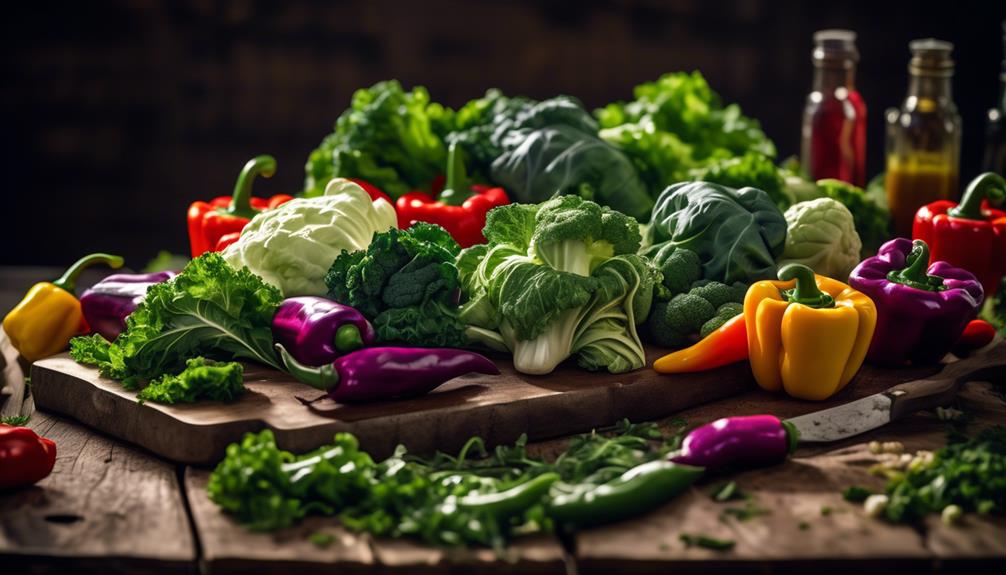You're on a mission to shed those extra pounds and live a healthier lifestyle. As luck would have it, there's a secret weapon hiding in the produce section of your local grocery store.
Yes, we're talking about low-carb vegetables that can turbocharge your keto weight loss journey. These veggies are not only delicious but also packed with essential nutrients to keep you feeling satisfied and energized throughout the day.
But which ones should you focus on? Well, get ready to discover the top low-carb vegetables that will help you reach your weight loss goals.
Spinach

Spinach is a nutrient-dense leafy green vegetable that can be a valuable addition to your low-carb keto diet. With its impressive nutritional benefits, incorporating spinach into your meals can enhance your overall health and support your weight loss goals.
One of the standout features of spinach is its rich vitamin and mineral content. Packed with vitamins A, C, and K, as well as folate, iron, and magnesium, spinach provides essential nutrients that promote optimal bodily functions. These nutrients aren't only beneficial for your overall well-being but also support your immune system and help combat inflammation.
When it comes to creative ways to use spinach in keto recipes, the possibilities are endless. You can enjoy spinach in salads, omelets, and smoothies. Alternatively, you can sauté it with garlic and olive oil as a side dish or add it to soups, stews, and casseroles for an added nutritional boost. Another option is to use spinach as a base for a low-carb pizza crust or incorporate it into keto-friendly wraps and sandwiches.
Broccoli
With its similar nutrient density and versatility, broccoli is another low-carb vegetable that can complement your keto weight loss journey.
Broccoli is packed with essential vitamins and minerals, making it a nutritious addition to your diet. It's rich in vitamin C, vitamin K, and folate, which support immune function, blood clotting, and cell growth. Broccoli also contains fiber, which aids in digestion and helps you feel full for longer periods.
In addition to its nutritional benefits, broccoli is incredibly versatile and can be used in a variety of easy keto-friendly recipes. You can enjoy it steamed or roasted as a side dish, or incorporate it into main dishes such as stir-fries or casseroles.
For a quick and simple low-carb meal, try making broccoli and cheese soup by blending steamed broccoli with chicken broth, cream, and cheddar cheese. Another delicious option is broccoli salad, which combines blanched broccoli florets with bacon, red onion, and a tangy dressing made with mayo, apple cider vinegar, and Dijon mustard.
Cauliflower
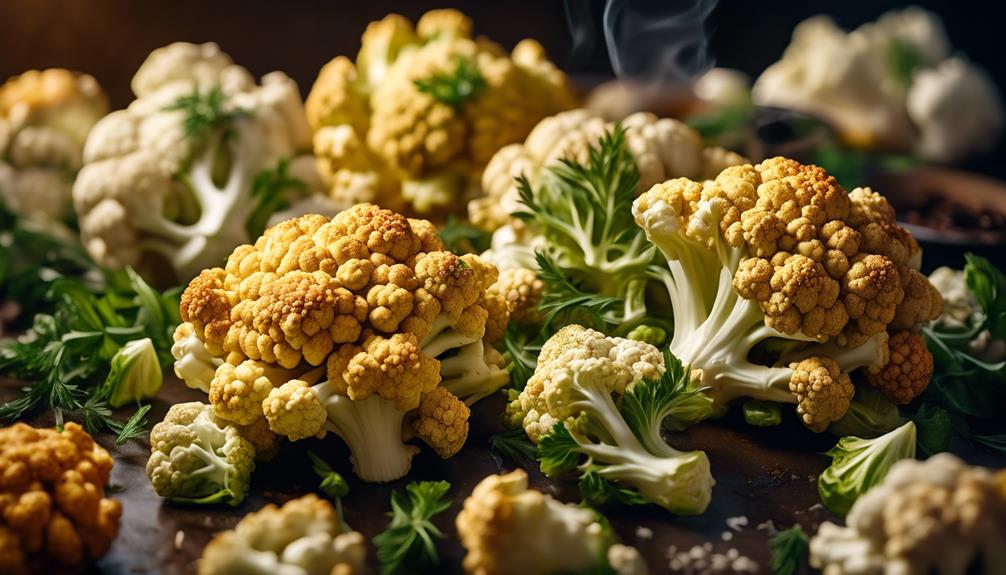
Cauliflower is a versatile and nutritious low-carb vegetable that can be a valuable addition to your keto weight loss journey. With its mild flavor and unique texture, cauliflower can be transformed into various dishes that will satisfy your cravings while keeping your carb intake in check.
Here are some reasons why cauliflower is a great choice for your keto diet:
- Nutritional value: Cauliflower is packed with essential vitamins and minerals, including vitamin C, vitamin K, and folate. It's also a good source of fiber, which can aid in digestion and help you feel full for longer.
- Cooking methods: Cauliflower can be cooked in a variety of ways to suit your taste preferences. You can steam or boil it to retain its nutrients, roast it for a crispy texture, or blend it into a creamy soup. You can even use cauliflower as a substitute for rice or potatoes in your favorite recipes.
- Versatility: Cauliflower can be used as a base for pizza crusts, mashed 'potatoes,' or even as a substitute for rice in stir-fries. Its neutral taste allows it to absorb the flavors of the ingredients it's cooked with, making it a versatile ingredient in many dishes.
- Low carb content: With only 3 grams of net carbs per 1 cup serving, cauliflower is a low-carb vegetable that won't derail your keto diet. It's an excellent choice for filling up your plate without exceeding your daily carb limit.
- Weight loss benefits: Cauliflower is low in calories and high in fiber, making it a great option for weight loss. Its high water content can also help you stay hydrated and feel full, reducing the chances of overeating.
Kale
If you're looking to add another nutritious and low-carb vegetable to your keto weight loss journey, consider incorporating kale into your diet.
Kale is a leafy green vegetable that offers numerous health benefits and is packed with essential nutrients.
In terms of nutritional value, kale is an excellent source of vitamins A, C, and K. It also contains minerals such as calcium, potassium, and magnesium, which are important for maintaining bone health and proper muscle function. Additionally, kale is rich in antioxidants, which can help protect your body against oxidative stress and inflammation.
One of the main health benefits of kale is its potential for weight loss. Despite being low in calories, kale is high in fiber, which can help you feel fuller for longer and prevent overeating. Moreover, the fiber in kale can also aid in digestion and promote a healthy gut.
Furthermore, kale is known for its anti-inflammatory properties. Inflammation is often linked to chronic diseases such as heart disease and diabetes, so incorporating kale into your diet can help reduce the risk of these conditions.
To enjoy the nutritional benefits of kale, you can add it to salads, smoothies, or sauté it with other low-carb vegetables. By including kale in your keto weight loss journey, you can enhance your overall health and well-being.
Bell Peppers
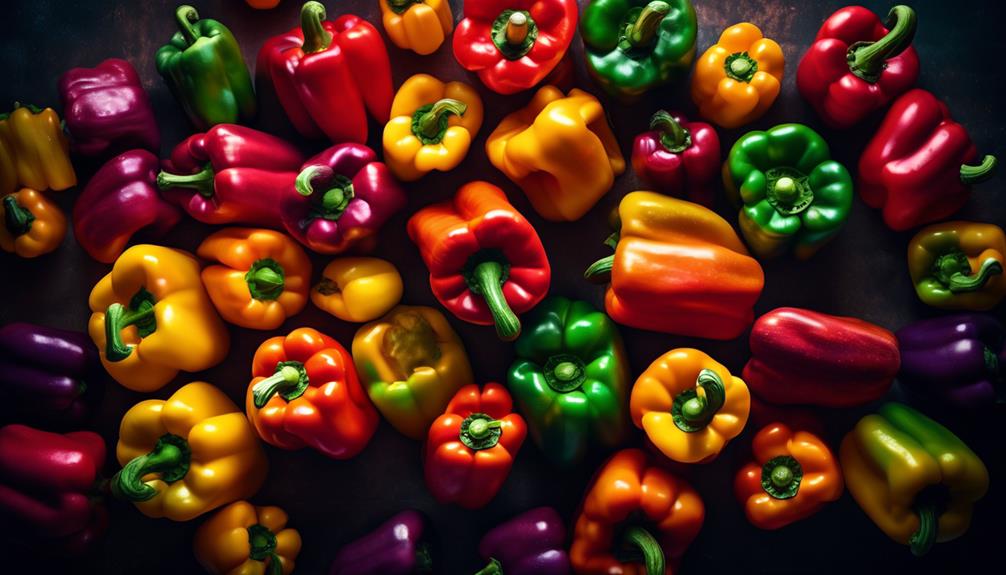
Bell peppers are a colorful and nutritious vegetable that can be a great addition to your keto weight loss journey. Here are some key points about their nutritional value and cooking methods:
- Nutritional value: Bell peppers are low in carbs and calories, making them an excellent choice for a keto diet. They're packed with essential vitamins and minerals, including vitamin C, vitamin A, and potassium. They also contain fiber, which can aid in digestion and promote feelings of fullness.
- Cooking methods: Bell peppers can be enjoyed raw or cooked, providing versatility in your keto meal options. They can be sliced and added to salads or used as a crunchy dipper for keto-friendly dips. Cooking methods such as grilling, roasting, or sautéing can enhance their natural sweetness and bring out their vibrant colors. You can stuff bell peppers with a variety of keto-friendly fillings, such as ground meat and cheese, for a satisfying meal.
- Quick stir-fry: Slice bell peppers into thin strips and cook them in a hot skillet with some oil, garlic, and your choice of protein. Serve over cauliflower rice for a low-carb, flavorful meal.
- Roasted bell peppers: Cut bell peppers into halves or quarters, remove the seeds and membranes, and roast them in the oven until they're tender and slightly charred. Use roasted bell peppers in salads, soups, or as a topping for keto-friendly pizzas.
- Stuffed bell peppers: Cut off the tops of the bell peppers, remove the seeds and membranes, and stuff them with a mixture of cooked ground meat, cheese, and keto-friendly vegetables. Bake them in the oven until the peppers are tender and the filling is cooked through.
Incorporating bell peppers into your keto diet can add a burst of color, flavor, and nutrition to your meals. Experiment with different cooking methods to find your favorite way to enjoy this versatile vegetable.
Zucchini
Zucchini is a low-carb vegetable that can be a great addition to your keto weight loss journey. It's packed with essential nutrients like vitamin C, vitamin A, and potassium.
Not only is zucchini low in carbs, but it's also versatile and can be used in a variety of creative recipes, such as zucchini noodles, zucchini boats, and zucchini chips. Incorporating zucchini into your keto diet can provide you with a nutritious and delicious way to stay on track with your weight loss goals.
Nutritional Benefits of Zucchini
Zucchini, a versatile and nutrient-rich vegetable, offers numerous health benefits that make it an excellent choice for those following a low-carb or ketogenic diet.
Here are some key reasons why you should incorporate zucchini into your meal plan:
- Low in carbs: With only 3 grams of carbs per cup, zucchini is a great option for those watching their carb intake.
- High in fiber: Zucchini is packed with fiber, promoting good digestion and helping you feel fuller for longer.
- Rich in vitamins and minerals: This vegetable is a great source of vitamin C, vitamin A, potassium, and manganese.
- Antioxidant powerhouse: Zucchini contains antioxidants that protect your cells from damage and support overall health.
- Versatility in recipes: From zucchini noodles to stuffed zucchini boats, there are endless possibilities to enjoy this nutritious vegetable.
Incorporating zucchini into your low-carb or ketogenic diet not only adds flavor and variety to your meals but also provides essential nutrients to support your overall well-being.
Creative Zucchini Recipes
To continue exploring the versatility of zucchini and how it can enhance your low-carb or ketogenic diet, let's dive into some creative zucchini recipes that will bring excitement and delicious flavors to your meals.
Zucchini is a nutrient-rich vegetable that's low in carbs and high in essential vitamins and minerals. It's also a great source of dietary fiber, which can help promote feelings of fullness and support healthy digestion.
One creative way to enjoy zucchini is by making zucchini noodles, or 'zoodles,' which can be used as a low-carb substitute for pasta.
Another option is to stuff zucchini with a mixture of ground meat, vegetables, and cheese, and bake until tender.
You can also try making zucchini fritters or zucchini chips for a crispy and satisfying snack.
With these creative zucchini dishes, you can enjoy the benefits of zucchini while adding variety and flavor to your low-carb or ketogenic diet.
Cabbage
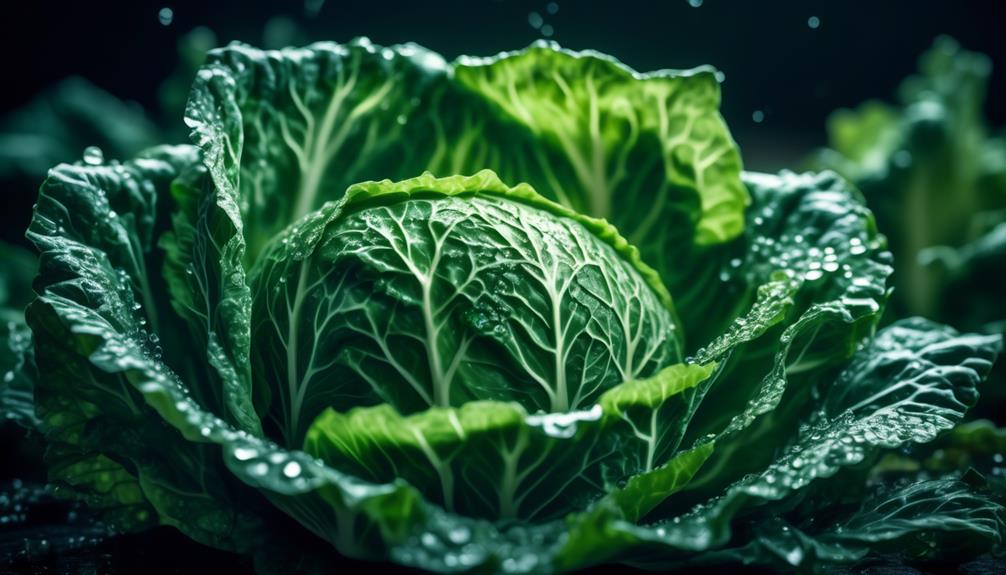
Cabbage is a low-carb vegetable that offers numerous nutritional benefits. It's rich in vitamins C and K, as well as fiber and antioxidants, which can support your overall health and weight loss goals on a keto diet.
Incorporating cabbage into your meals can be done creatively, such as using it as a base for salads, making cabbage rolls, or stir-frying it with other low-carb ingredients.
Nutritional Benefits of Cabbage
With its impressive array of nutrients, cabbage offers numerous health benefits for those following a low-carb ketogenic diet. Here are some of the nutritional benefits of cabbage and creative ways to incorporate it into your keto meals:
- High in fiber: Cabbage is rich in fiber, which helps promote digestive health and keeps you feeling full.
- Low in carbs: Cabbage is extremely low in carbs, making it an excellent choice for keto dieters.
- Rich in vitamins and minerals: Cabbage is packed with vitamins C and K, as well as folate and potassium.
- Antioxidant-rich: Cabbage contains powerful antioxidants that help protect against cell damage and inflammation.
- Versatile and tasty: Cabbage can be enjoyed raw in salads, sautéed as a side dish, or used as a wrap instead of tortillas.
Incorporating cabbage into your keto meals not only adds variety but also provides you with essential nutrients to support your weight loss journey. So why not get creative and explore all the delicious ways you can enjoy this nutritious vegetable?
Creative Ways to Incorporate Cabbage in Your Keto Meals
Get ready to discover creative and delicious ways to incorporate this nutritious vegetable into your keto meals.
Cabbage is a versatile vegetable that can be used in various dishes, including salads and stir-fries.
For a refreshing and crunchy option, try making a cabbage salad. Simply shred the cabbage and toss it with your favorite low-carb dressing, along with other keto-friendly ingredients like sliced almonds, cherry tomatoes, and avocado. This salad isn't only full of flavor but also packed with essential nutrients.
Another way to enjoy cabbage on your keto diet is by making a cabbage stir fry. Sauté thinly sliced cabbage with some olive oil and garlic, then add your choice of protein and seasonings. This quick and easy dish is a great way to incorporate cabbage into your keto meals while adding a delicious twist to your usual stir fry.
Asparagus
Asparagus is a versatile low-carb vegetable that can be enjoyed in a variety of keto-friendly meals. It not only adds a delicious crunch to your dishes but also provides numerous health benefits.
Here are some asparagus recipes and the health benefits they offer:
- Asparagus and Parmesan Frittata: This recipe combines asparagus with eggs and parmesan cheese to create a satisfying and protein-rich breakfast option.
- Grilled Asparagus Salad: Grilling asparagus enhances its natural flavors and makes it a perfect addition to a refreshing summer salad, packed with vitamins and minerals.
- Roasted Asparagus with Garlic: Roasting asparagus with garlic brings out its natural sweetness and creates a flavorful side dish that pairs well with any keto meal.
- Asparagus Wrapped in Bacon: Wrapping asparagus spears in bacon not only adds a delicious smoky flavor but also provides a good source of healthy fats and proteins.
- Creamy Asparagus Soup: This creamy soup is made with pureed asparagus, cream, and spices, making it a comforting and nutritious option for a low-carb meal.
In addition to its versatility in recipes, asparagus is rich in fiber, vitamins A, C, and K, and various minerals. It also contains antioxidants that contribute to overall health and may help reduce the risk of chronic diseases.
Incorporating asparagus into your keto diet can provide a tasty and nutritious boost to your meals.
Brussels Sprouts
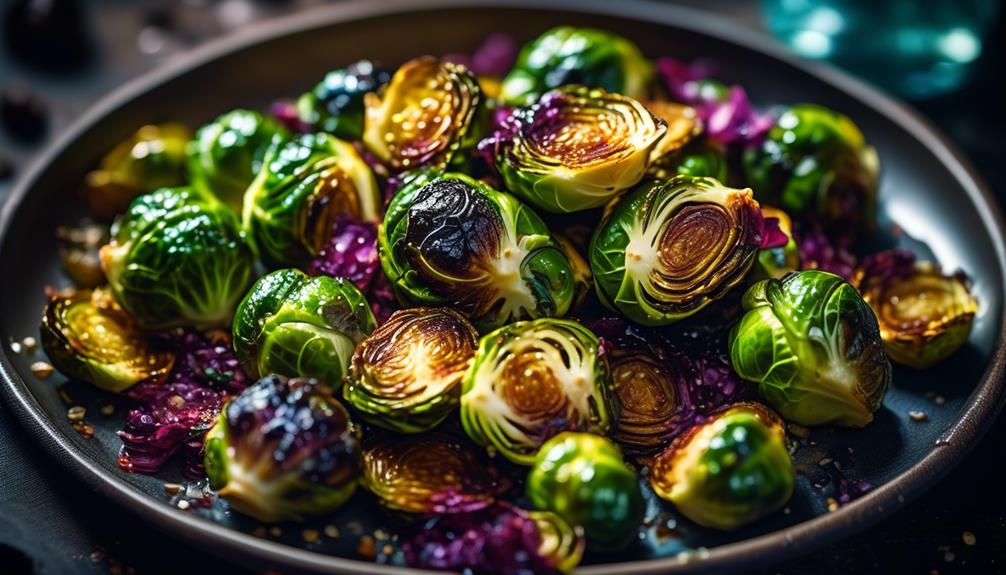
Brussels sprouts, a nutrient-dense cruciferous vegetable, are a fantastic addition to your keto diet. These miniature cabbages aren't only low in carbs but also packed with essential nutrients that support your overall health. One cup of cooked Brussels sprouts contains about 8 grams of carbs and 4 grams of fiber, making them a great option for those following a low-carb or ketogenic eating plan.
In addition to being low in carbs, Brussels sprouts are rich in vitamins and minerals. They're an excellent source of vitamin K, which is important for blood clotting and bone health. They also provide vitamin C, an antioxidant that supports immune function and collagen production. Moreover, Brussels sprouts are a good source of folate, manganese, and potassium.
When it comes to cooking methods, steaming or roasting Brussels sprouts can help preserve their nutritional value. These methods retain the vegetable's natural flavor and texture while minimizing nutrient loss. Avoid boiling Brussels sprouts for too long, as it can lead to nutrient degradation. Instead, aim for a tender-crisp texture that enhances their taste.
Green Beans
Green beans are a nutritious addition to a keto diet due to their low-carb content and high fiber content. They're also a good source of vitamins A, C, and K, as well as minerals like potassium and magnesium.
Green beans can be easily incorporated into your meals by steaming, sautéing, or roasting them, making them a versatile and healthy option for weight loss on a keto diet.
Nutritional Benefits
With their vibrant color and rich nutritional profile, green beans offer a range of health benefits that can support your keto weight loss journey. Including a variety of low carb vegetables in your diet is important for overall health, and green beans are a great option to consider. Here are some of the nutritional benefits they provide:
- Low in carbs: Green beans are low in carbohydrates, making them a suitable choice for those following a keto diet.
- Fiber-rich: These vegetables are high in fiber, which can promote digestion, regulate blood sugar levels, and support weight management.
- Nutrient-dense: Green beans are packed with vitamins and minerals, including vitamin C, vitamin K, and folate.
- Antioxidant properties: They contain antioxidants that help protect your body against oxidative stress and reduce the risk of chronic diseases.
- Hydrating: With a high water content, green beans can contribute to your daily hydration needs.
Cooking and Preparation
To prepare green beans for cooking, you can start by trimming the ends and removing any tough strings. This will ensure that your green beans are tender and easy to eat.
Once you have prepared them, there are various cooking techniques you can use to enhance their flavors and textures.
For example, you can sauté green beans in olive oil with some garlic for a simple and delicious side dish.
Another option is to roast them in the oven with a sprinkle of salt and pepper for a crispy and flavorful result.
Incorporating green beans into your meal planning can add variety and nutrition to your keto diet.
Celery
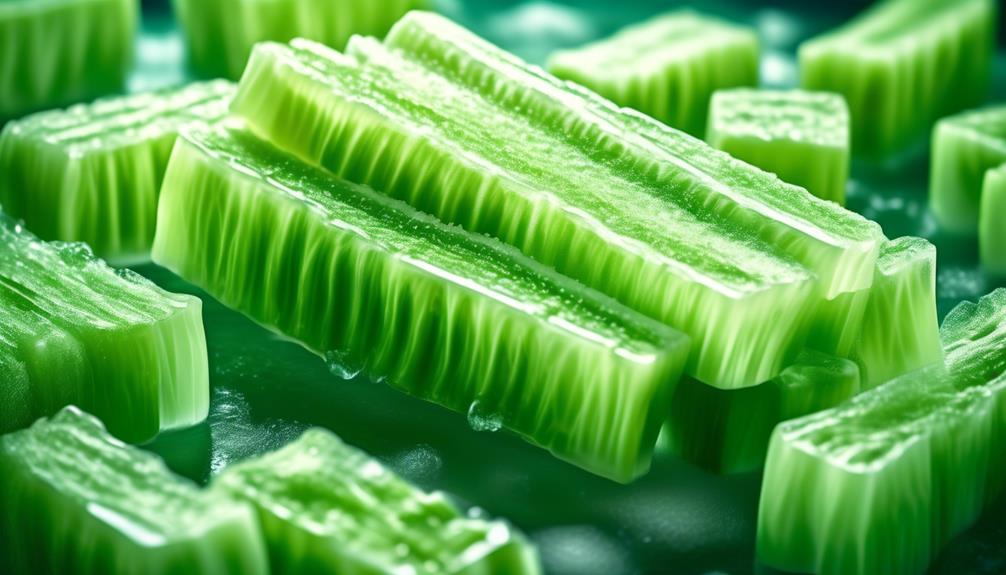
Celery is a versatile and nutrient-dense vegetable that can be a valuable addition to your low-carb keto diet. Not only is it low in carbs, but it also offers numerous health benefits. Here are some reasons why you should consider incorporating celery into your keto meal plan:
- Weight loss aid: Celery is low in calories and high in fiber, which can help you feel full and satisfied while consuming fewer calories.
- Hydration: With a water content of about 95%, celery can contribute to your daily fluid intake and help keep you hydrated.
- Antioxidant properties: Celery is rich in antioxidants, such as apigenin and luteolin, which can help protect your cells against damage from free radicals.
- Digestive health: The fiber in celery can promote healthy digestion and prevent constipation.
- Versatility: Celery is a versatile vegetable that can be enjoyed in a variety of ways. From adding it to salads and soups to using it as a crunchy snack or even making celery juice, the options are endless.
Incorporating celery into your keto diet not only adds flavor and crunch to your meals but also provides you with a range of health benefits. Try out different celery recipes and enjoy the delicious and nutritious benefits this vegetable has to offer.
Cucumber
Cucumbers are a refreshing and low-carb vegetable that can be a great addition to your keto diet. They're packed with essential nutrients and offer numerous health benefits. With only 2 grams of net carbs per 100 grams, cucumbers are an excellent choice for those following a low-carb or ketogenic eating plan.
When it comes to nutritional value, cucumbers are mostly made up of water, which makes them incredibly hydrating. They're also a good source of vitamins C and K, as well as minerals like potassium and magnesium. Additionally, cucumbers contain antioxidants that help fight inflammation and protect against chronic diseases.
Including cucumbers in your diet can contribute to weight loss and management. Their high water content and low calorie count make them a satisfying and filling snack. They also promote healthy digestion due to their fiber content, aiding in proper bowel movements and preventing constipation.
Furthermore, cucumbers have been associated with improved skin health. Their high water content helps hydrate the skin, while their antioxidants and vitamins contribute to a youthful complexion. They can also reduce puffiness and inflammation around the eyes when used as a natural remedy.
Radishes
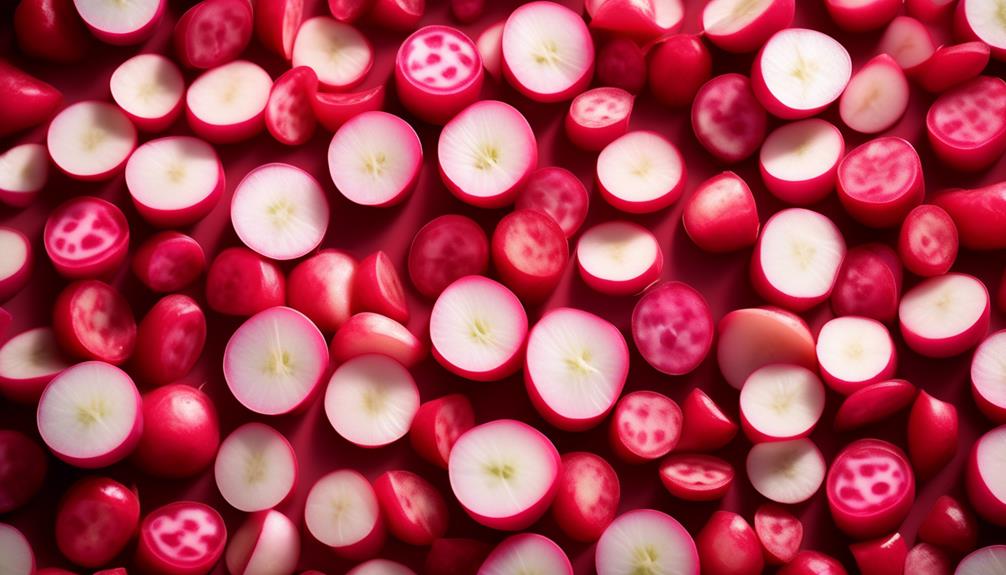
Radishes, another low-carb vegetable, offer a variety of health benefits that make them a great addition to your keto diet. These crunchy and peppery root vegetables aren't only low in carbs but also packed with essential nutrients. Here are some of the nutritional value and health benefits of radishes:
- Low in carbs and calories: With only 2 grams of carbs and 19 calories per cup, radishes are an excellent choice for those on a low-carb or calorie-restricted diet.
- Rich in fiber: Radishes are a good source of dietary fiber, which can help promote healthy digestion and prevent constipation.
- High in vitamin C: Just one cup of radishes provides about 30% of the recommended daily intake of vitamin C, an essential nutrient that supports immune function and collagen production.
- Contains antioxidants: Radishes are rich in antioxidants like anthocyanins and isothiocyanates, which help protect your cells from damage caused by harmful free radicals.
- May aid in weight loss: Radishes are low in calories and high in water content, making them a filling food that can help you stay satisfied and potentially assist in weight loss efforts.
Incorporating radishes into your keto diet is an excellent way to enjoy their nutritional value and health benefits while keeping your carb intake in check. Whether you enjoy them raw in salads, pickled, or roasted, radishes can add a flavorful and nutritious touch to your meals.
Mushrooms
Mushrooms aren't only delicious, but they also offer numerous nutritional benefits. They're low in carbs and calories, making them an excellent choice for those following a keto diet.
Additionally, mushrooms are a good source of fiber, vitamins, and minerals. Incorporating mushrooms into your meals can enhance the flavor and texture while providing a nutritious option for your weight loss journey.
Nutritional Benefits of Mushrooms
With their unique nutritional profile and versatile culinary uses, mushrooms offer a variety of health benefits that make them a valuable addition to any low-carb or keto diet.
Here are some of the nutritional benefits of mushrooms:
- Low in carbohydrates: Mushrooms are naturally low in carbs, making them an excellent choice for those following a low-carb or keto diet.
- High in fiber: Fiber is essential for maintaining a healthy digestive system and promoting weight loss. Mushrooms are a good source of dietary fiber.
- Rich in vitamins and minerals: Mushrooms are packed with essential nutrients like vitamin D, B vitamins, potassium, and selenium, which are important for overall health and well-being.
- Antioxidant properties: Mushrooms contain antioxidants that help protect the body against oxidative stress and reduce the risk of chronic diseases.
- Boost metabolism: Certain types of mushrooms, such as shiitake and oyster mushrooms, have been found to have compounds that can increase metabolism and aid in weight loss.
Incorporating mushrooms into your low-carb or keto diet can provide you with these nutritional benefits while adding a delicious and earthy flavor to your meals.
Cooking With Mushrooms
To enhance the flavors of your low-carb or keto meals, consider incorporating mushrooms into your cooking repertoire. Not only do mushrooms add depth and umami taste to your dishes, but they also come with a range of health benefits.
When it comes to cooking techniques, mushrooms are incredibly versatile. You can sauté them with garlic and butter for a simple and flavorful side dish, or use them as a meat substitute in dishes like mushroom burgers or mushroom stir-fries. Additionally, you can stuff mushrooms with a variety of fillings and bake them for a delicious appetizer or main course.
Mushrooms are also low in carbohydrates and calories, making them an excellent choice for those following a keto or low-carb diet. Plus, they're a good source of fiber, vitamins, and minerals, such as potassium and selenium.
Mushroom Recipes for Keto
Now that you understand the versatility and health benefits of incorporating mushrooms into your low-carb or keto meals, let's explore some delicious and keto-friendly mushroom recipes.
Here are five mouthwatering options to try:
- Creamy Mushroom Soup: A comforting and satisfying soup made with sautéed mushrooms, onions, garlic, and heavy cream. It's a perfect keto-friendly option for colder days.
- Garlic Butter Mushroom Stir-Fry: Sautee sliced mushrooms in garlic-infused butter for a quick and flavorful side dish. Add some low-carb vegetables like spinach or zucchini for added nutrients.
- Stuffed Portobello Mushrooms: Fill portobello mushroom caps with a mixture of cream cheese, herbs, and grated cheese. Bake until golden and bubbly for a tasty and filling keto-friendly appetizer.
- Mushroom and Bacon Skewers: Thread mushrooms and bacon onto skewers and grill them for a smoky and savory keto-friendly dish. Perfect for summer barbecues or as a party appetizer.
- Mushroom and Spinach Omelette: Whip up a protein-packed breakfast by sautéing mushrooms and spinach, then folding them into a fluffy omelette. Add some grated cheese for extra flavor.
These recipes won't only satisfy your cravings but also keep you on track with your low-carb or keto lifestyle. Enjoy the delicious flavors of mushrooms while staying true to your dietary goals.
Conclusion
In conclusion, the top low-carb vegetables for keto weight loss include:
- Spinach
- Broccoli
- Cauliflower
- Kale
- Bell peppers
- Celery
- Cucumber
- Radishes
- Mushrooms
These veggies provide essential nutrients while being low in carbohydrates, making them perfect for a keto diet. Incorporating these vegetables into your meals can help you achieve your weight loss goals while maintaining a healthy and balanced diet.
So, go ahead and enjoy these tasty and nutritious veggies as part of your keto journey!

